Despedida
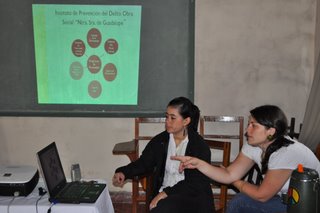 Today was our last day in Paraguay. We started out the day by heading out to Itaugua which is known for its embroidery known as nanduti. We visited Tekojoja Kuna Rembiapope (Justice for the Women in her Work), a fair trade project of the Sisters of the Good Shepard. The project is called Handcrafting Justice. Their goals are to eliminate poverty and hunger, and to promote gender equality and women's autonomy. We met with the artisans Lucia who explained the fine nature of their work, and then Roberto, a Maka Indigenous person who works with handcrafts to make ends meet. He complained that Lugo promised to make helping Indigenous peoples one of his first priorities, but so far he has not done much. Even the head of the Indigenous Affairs Institute is open. 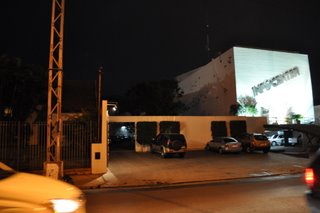 In the afternoon, Federico Tatter took us around to some of the recent historical sites in Asuncion and explained the recent political history of repression, starting with a 1947 civil war that brought the Colorado Party to power. A highlight on the tour was a visit to the spot on Ave Espana where an Argentine guerrilla group killed the former Nicaraguan dictator Anastacio Somoza in September 1980 after he fled to Paraguay in the aftermath of the Sandinista revolution. In the evening, we returned to the Truth and Justice Commission office for a forum on disarming violence. School of the Americas Watch people from our delegation explained their mission, which launched a lengthy discussion of violence, Plan Colombia, and strategies for reducing violence. Joining in the conversation were relatives of the victims of a 2004 fire in a supermarket in Asuncion that killed 400 people. The guards had locked the doors so that no one could leave without paying for their groceries. Family members are fighting for justice in the case. 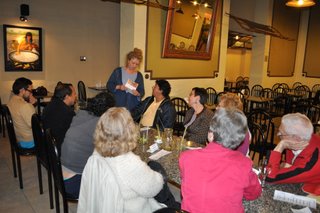 The evening ended with a despedida for Vidal. Now it's late, and I need to get to bed so that I can fly to Rio tomorrow for the LASA conference.
Iguazu
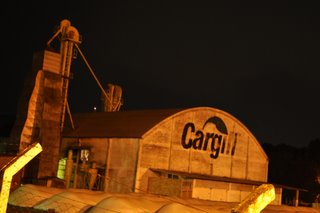 We woke up early this morning to drive across Paraguay to Ciudad del Este. It's a long drive, and as we approach the other side of the country we increasingly pass agrobusiness outfits like Cargill, Dreyfus, ADM. We see Mennonite farms with well-kept lawns and houses with corn and soybean and wheat fields that look a lot like South Dakota where I grew up. 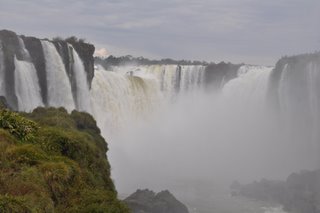 We cross the border at Ciudad del Este into Brazil surprisingly without any immigration formalities. We continue on down the road until we arrive at the famous Iguazu Falls. I've been on the Argentine side of the falls, but this is my first time on the Brazilian side. We jump on a bus that drops us off the road where we hike down a trail to catch a better view of the falls, take too many pictures (see http://picasaweb.google.com/marcbecker2/Iguacu), and then come back up. After a short visit, we get back on the bus and head back across the Friendship Bridge across the Parana river to Paraguay. 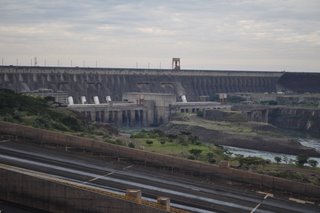 Before heading back to Asuncion, we made a detour to the Itaipu dam. It is one of the biggest hydroelectric dams in the world, and currently a source of controversy between Brazil and Paraguay. Dictatorships in both countries signed the agreement to build the dam in the 1960s, but the agreement very much favors Brazil. Paraguay wants to negotiate the contract, but Brazil of course is not so interested. The presentation at the visitors center of course skips over all of these politics, as well as the ecological and social disruptions of these large development projects. They want us to believe that everything with the dam is just fine. After a long drive back across Paraguay, we're finally back at our hotel in Asuncion and very much ready to sleep. Tomorrow is the last full day here.
Asuncion
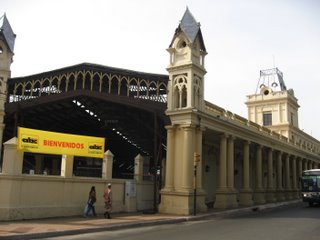 Sundays are slow, quiet days in Asuncion (like in Quito), with most people spending the day with their families rather than worrying about gringo touristy things to do. So, we started out slow and walked downtown past the pantheon of martyrs and to a bookstore that was closed. We continued on to an old train station that had an artisan market set up in it. We then slowly drifted back to the hotel, stopping for lunch along the way. 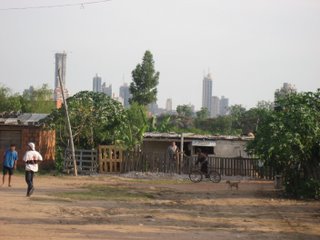 In the afternoon we headed to an area of slums along the river on the edge of Auncion known as Los Banados. The slum lies right under the city's skyline. People first came here from the countryside about 100 years ago. 65,000 families now live in this area. New people live closer to the river, often on landfills and trash dumps that slowly reclaim land along the river banks. Most people survive on a hand-to-mouth existence, living off of economic activities like raising pigs or recycling trash. Twenty percent of the people have formal sector employment, and the rest engage in a variety of survival strategies. 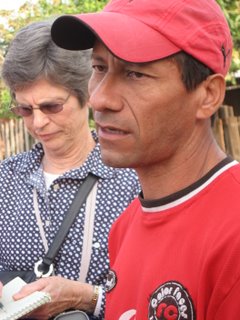 We met community organizer Patricio Pinto who walked us through the area. He said that the community had done everything, that the government had very little presence here. Community members organized themselves into the Coordinadora de los Banados with the goal of building better roads and more dignified housing. Maria Garcia works with women's organizations. Often women lead the community organizing efforts. 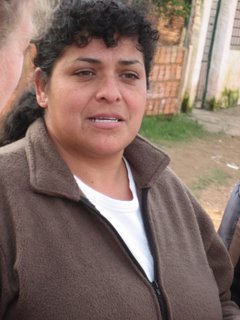 Buses do not come into the neighborhood because they are afraid of crime in the area. But local organizers say that crime exists everywhere in Asuncion, and that these companies ignore problems of white collar crime. This is known as the criminalization of poverty. Carlos Hector Ferrera in the Pasaje San Agustin area of Los Banados lives off of recycling trash. He complained that recently prices have been dropping, with capitalists gobbling up the profit margins. He used to be able to sell plastic bottles for 1300G but now it has dropped to 1000G; paper has dropped even more, from 8000 to 300G. 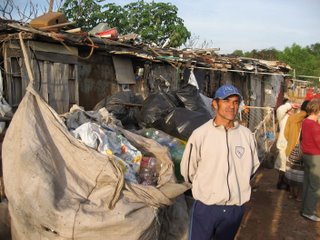 Our final stop was in San Miguel which used to be a military brick factory. Five years ago people started to move into this area. It has the advantage of being higher and sandier than surrounding areas, so it does not get flooded as easily or as often. Community leader Juan Martinez complains that Asuncion's mayor promises aid, but she was a TV personality not a politician and does not know how to follow through on her promises. The result is that the people in the community are left behind. 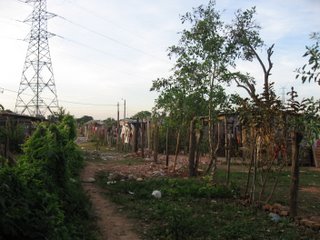
Segunda Linea
 This morning we drove out from Caaguazu down a very red dirt road for about 2 hrs past rolling fields of corn, sorghum, sugar cane, and cattle. We arrived at Segunda Linea where Antonio Galeano was leading a meeting of the Movimiento Agrario y Popular (MAP). They are planning a congress for June, and were talking about facing the alternatives of the advancement of socialism or dealing with the collapse of the capitalist crisis. He said that agrobusiness commercializes food which leads to hunger and protest. It is necessary to build a political consciousness in order to confront this situation. 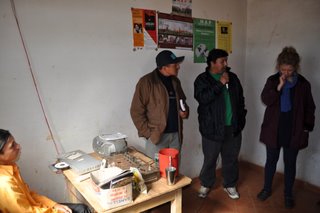 Antonio noted that they just started a new community radio station this past week called Radio Tekojoja (Guarani for Equality). They had a simple room as their broadcast booth with an old rusty sound board, a dvd/cd player, a boombox, and a single mike. A kid sat at a table running the equipment. One person apologized because they did not have a computer yet. A wire rather thru a hole in the wall and out to a tower set up outside their building. Halfway up the tower was a box that houses their transmitter. And with this simple equipment they can broadcast their message of sustainable agriculture and a better future for more than 50 kilometers around. 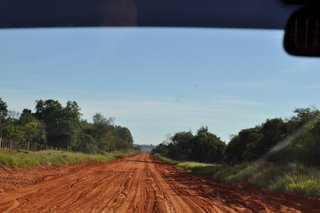 We were supposed to have lunch with the community, but signals were crossed and that didn't happen. Instead, we got back in the bus for the trip back up the bumpy, dusty red dirt road to Caaguazu were we had lunch, and then back to Asuncion (where we are in a hotel w/ very flaky Internet). It feels like we spent most of the day in the bus and now I have a cold, but it was nice being out in a rural area w/ these folks. I wish we could have spent more time with them.
Organizacion Lucha por la Tierra
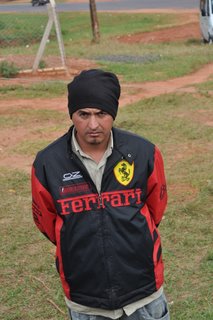 On Friday we met with the Organizacion Lucha por la Tierra (OLT) in Capiibary. We met with Blas Flores who is the youth coordinator of OLT. He gave us some background on the organization and its struggle gain land for those without any. He identified the primary enemy as Brazilian large landholders who are increasingly taking over land for monoculture soybean production. They conceptualize their struggle as a broad one, including an attempt to recover national sovereignty from Brazilian incursions and to control transgenic crops and fumigation which is overrunning neighboring small landholdings. OLT builds on the model of the Landless Workers Movements (MST) in Brazil. 84 people in OLT have gone to jail for their actions, 5 remain in prison, and others are under house arrest, including risking imprisonment if they continue their political actions. The government goal is to decapitate the organization, thereby halting the organization's efforts. The charges they face include invasion of land and disturbing the peace. Three people have been killed in the struggles. We then went up the road to a small camp that is building their efforts to recuperate an estate. The process usually takes 3-4 years, including building a political formation among those who plan to occupy the land. 15 people are at the camp, and they rotate through on two-week cycles. Others have to go work jobs to survive financially while they carry on their struggles. Some of the rhetoric of national sovereignty and whipping up nationalist sentiments against Brazil bothers me as being dangerously nativist. At the same time, the OLT's connections with MST provide an interesting example of transanational grassroots organizing. 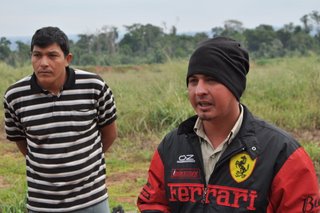 People in OLT allied with Fernando Lugo in his presidential campaign last year because of his history of working with rural movements. But Lugo is just one person who doesn't represent taking power. Campesinos have few friends in power, so occupying land is the only way to improve their lives. The Ministry of Agriculture still wants to implement a neoliberal model. Lugo doesn't make change, the OLT militants told us, we have to make these changes from the bottom up. The struggle continues because the same structures are still in place as before under previous presidents. In addition to the need for agrarian reform, the supreme court is also very strong that keeps the exclusionary dominant structures in place. The dominant culture including the press present the land occupations in very negative terms as invasions by people who do not want to work. The OLT faces constant propaganda, which means that they have to explain sustainable agriculture to people to confront the capitalist model. The police also try to infiltrate people into the movement to destroy it from within. 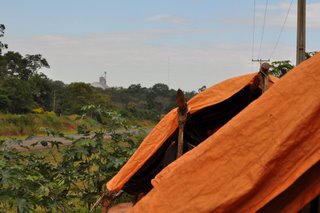 After visiting this small camp we continued on to another much larger camp Aldo Brisuela named after a one year old child who was killed in the struggle. 1500 people are trying to occupy 47,000 hectares owned by General Rodriguez who acquired it through corrupt means after overthrowing Stroessner in 1989. Unfortunately, the road was too rough and we had not planned enough time and we just saw the camp at a distance. We're spending the nite in the Hotel International in Caaguazú which doesn't have Internet, so I guess it is not very international. So I hiked into the center of town along a busy road to find some Internet. The best Internet I've had so far in this country was in the rural retreat center where we spent last nite.
Centro Educativo Integral Ko'e Pyahu
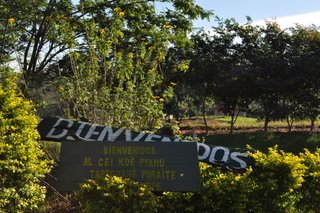 We woke up early this morning in Asuncion and drove out to the Integral Educational Center by Union in the department of San Pedro. Students and teachers met us at the front gate, and took us on a tour of the school. They have about 10 hectares planted with organic vegetables and fruit trees to grow for the school's use. The students come from organized communities both to gain a high school education and to learn how to develop sustainable agricultural programs. Their parents also volunteer at the school, so that they know what is happening with their children's educational process. Gaining the parents' support is critical to the educational process. There are 92 students (30 females and 62 and males) in six classes. They are developing a new educational process that responds to the current needs of campesinos. Director Jose Parra told us that they are working for better, more sustainable agriculture without transgenics. The school has functioned for 11 years. 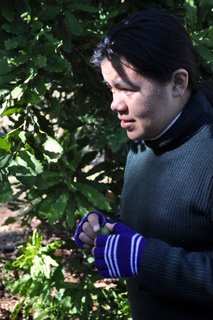 Today was a beautiful day, but it quickly gets dark after 5pm and the temperature begins to drop. Now we're gathered around a table at a school where we are staying drinking mate and coffee and worrying about mosquitos. Why would mosquitos be out when it is so chilly?
Truth and Justice Commission
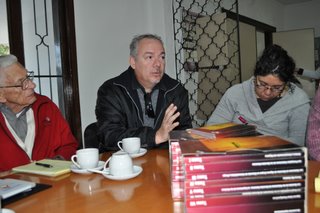 This morning we had a lengthy conversation with several members of the Truth and Justice Commission For me it was very thought provoking. Why did Stroessner engage in so many human rights abuses, and why did the US maintain such good relations with the dictatorship? There are not clear or easy answers. Many of the people who worked on the commission (which has now completed its mandate) are children or relatives of victims of the dictatorship. They gave us a copy of their exhaustive 8-volume report. They also have copies of military files, and again the historian in me just wants to dive into this wealth of info. The Commission's report states that during the Storessner dictatorship there there were 20,090 victims. Among these: 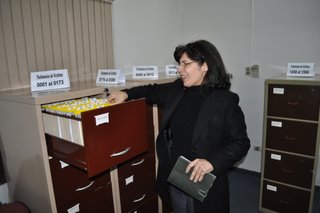 19,862 arbitrary or illegal arrests 18,772 tortured 59 extrajudicial executions 336 disappeared 3,470 exiled We then visited with Senator Sixto Pereira, whose office in the legislative palace overlooked slums along the river. He talked about how what is happening in Paraguay is not so much a transition to democracy as the application of a neoliberal model. He talked about the overwhelming presence of argro-business interests in the congress, which makes working for food sovereignty, sustainable agriculture, and social justice difficult. 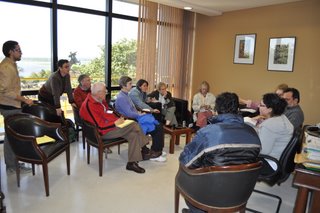 In the afternoon we took a bus out to a Franciscan mission at Yaguaron. By the time we arrived it was dark, but we found the caretaker to open it for us. The walls are very thick, and he hold us that local rumors say that they are so thick because Indians killed in the building of the church are buried in the walls. By the time we get back to Asuncion it is late and I run out of time to write more about the day and the Internet connection in this hotel is very flaky and we have to get up early in the morning to go to the campo. We'll be back Saturday nite. 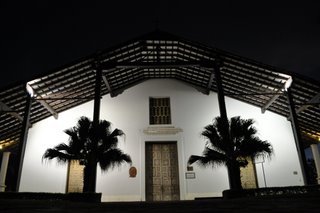
Terror Archives
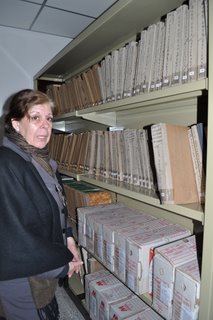 This morning we went to the Terror Archive, which was an absolutely fascinating place to be. I'd like to return on a research trip to investigate more of what is available there. 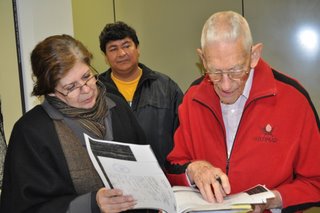 The Stroessner dictatorship expelled Frisco Gilchrist, one of our delegation members, in 1976. Archive staff gave him a copy of the interview the police did with him in 1976, and the followup on his denouncing human rights abuses in Paraguay upon his returning to the States. There is audio of him describing these events at http://www.yachana.org/reports/paraguay/audio/7.FriscoGilchrist1.mp3. Absolutely fascinating. In the afternoon we talked with Juan Martens of the Coordinadora de los Derechos Humanos de Paraguay about military abuses, and then Serpaj member Vidal Acevedo talked more about military conscription. 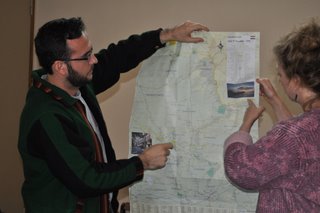 I have to run to a meeting right now, but I'll try to write more later.
Asuncion
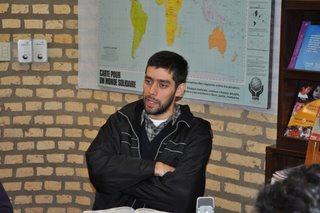 I arrived in Asuncion late last night after a long trip from Juliaca via Sao Paulo. At least I had a productive flights and pulled together my report on the Indigenous Summit in Peru (listen to my story on FSRN at http://www.fsrn.org/audio/indigenous-groups-conclude-continental-summit-peru/4811). Our delegation began this morning with a meeting with economist Luis Rojas of Base Investigaciones Sociales at the offices of Serpaj (Servicio de Paz y Justicia). Rojas laid out an overview of Paraguayan history, including the growth of modern agrobusiness which makes intensive use of land and capital but results in little demand for labor. The growth of soy production and the presence of large transnational agrobusiness corporations like Cargil, Monsanto, and ADM forces campesinos into the urban periphery where they suffer from a lack of work. (To put this in context, those same corporations largely made family farms financially unviable in the United States which is why I left South Dakota in search of a better life.) Current Paraguayan president Fernando Lugo came to office last year after 60 years of Colorado Party domination that used repression and property laws to assure elite control over society. He was a priest influenced by liberation theology, and promises to use power to make life better for previously dispossessed people. 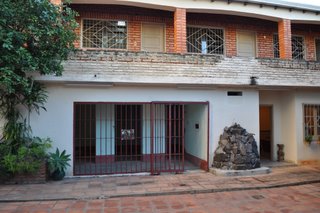 In the afternoon we went to the Memory Museum which had previously housed a torture center during the 35-year Stroessner dictatorship. Maria Stella Caceres, the director of the museum, took us on a tour of the museum with a detailed and enlightening explanation of what took place in the "National Office of Technical Matters." Apparently the "technical matter" was how to keep people alive under torture. The government used this center to detain and torture communists and other real and perceived dissidents. Many of the people who conducted the torture were trained by the U.S. Army School of the Americas that is now located in Ft. Benning, GA. Martin Almada who was detained and tortured at this center from 1974-1977 told us of his experiences, and provided a passionate call to close the SOA.

| Marc Becker's Home Page
| marc@yachana.org |
|

